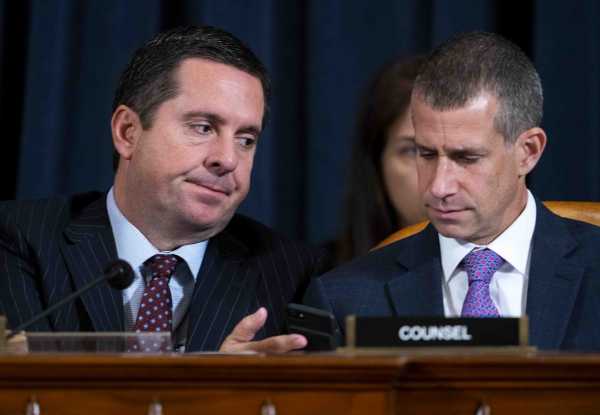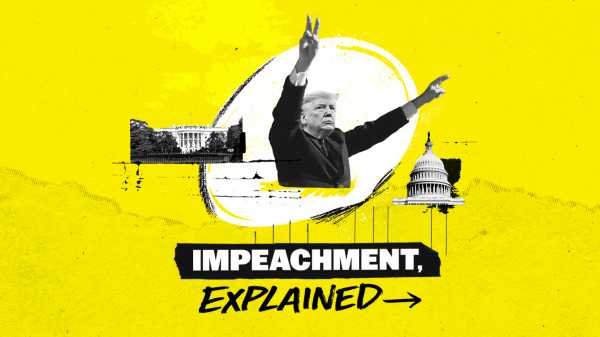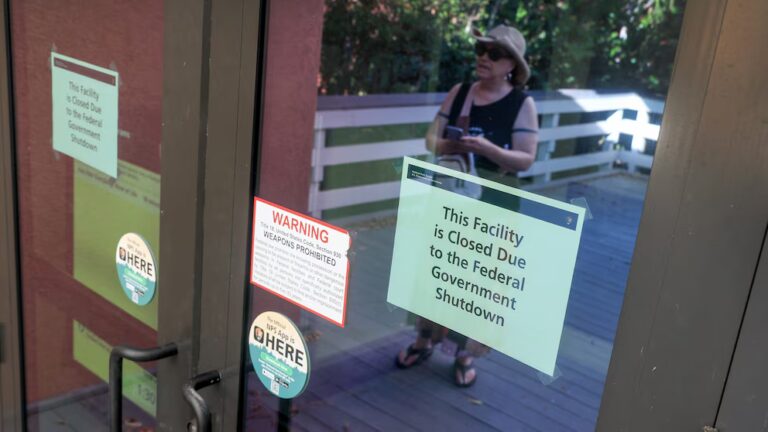
Republicans haven’t used the impeachment hearings against President Donald Trump to question the underlying facts of the case Democrats are making against him. Instead, they’ve gone all in for Trump, echoing conspiracy theories and pushing alternative narratives for conservative media to consume.
Devin Nunes, the House Intelligence Committee ranking member from California, spent most of his time at the November 13 hearing railing against the media. “Anyone familiar with the Democrats’ scorched-earth war against President Trump,” he said, “would not be surprised to see all the typical signs that this is just a carefully orchestrated media smear campaign.”
Other Republicans, like Jim Jordan (R-OH), obsessed over the identity of the whistleblower whose complaint initiated the impeachment process. The point, of course, was to divert attention away from the substance of the claims (which were already corroborated by transcripts released by Trump’s own White House).
There really is no doubt that Trump did what Democrats accused him of doing. But so far, Republicans have been unwilling to admit it. They may be dishonest, and they’re almost certainly acting in bad faith, but are they being irrational? Not necessarily.
I reached out to David Jolly, a former GOP Congress member from Florida. Jolly left Congress in 2017 and has since renounced his membership in the Republican Party. He explained his reasoning in an article last year, rejecting not only Donald Trump, but what the Republican Party had become.
“Republicans in Congress,” he told me, are now “tearing at the fabric of the Constitution every bit as much as Donald Trump” and “undermining the institution of Congress every bit as much as Trump.”
We talked about what that means, why Republicans have been forced into an impossible position by Trump, and why Trump’s impact on the party will continue long after he leaves office.
A lightly edited transcript of our conversation follows.
Sean Illing
You’ve been watching the impeachment hearings in Congress the last few weeks. What do you make of the Republican strategy so far?
David Jolly
As a short-term strategy, it will probably work in terms of ensuring an acquittal in the US Senate and preventing any erosion of the GOP base. Which is huge since Trump can’t win without replicating his 2016 victory, and that means narrowly pulling off a few key states and he can’t do that without firing up the core supporters.
As for Congress, I think we just have to recognize how culturally broken our politics is. There is real animosity between the two sides that gets reinforced due to gerrymandered districts that insulate members from accountability, and we have a media environment that funnels partisan news to target audiences.
Sean Illing
That’s all true, but you were just in Congress. You know these people. I assume you still talk to them. What are they thinking?
David Jolly
I can’t tell you how many Republican members of Congress have told me, “I’m just trying to keep my head down and not get noticed.” They see all the excitement stirred up by people like Jim Jordan and Devin Nunes but at least half the caucus wants to stay the hell out of the media. They’re not looking to make a name through this, they’re looking to survive this.
I struggle with whether some of their behaviors are an intentional decision on their part to engage in either misdirection, or to overlook the facts because they have a fealty to the president or because they want to put a stake in the ground in right-wing media or because it just works in their districts. Or are some of them just duped into it by following the leader?
I honestly don’t know. It’s probably a mix of all of the above.
“I think the Lindsey Graham we’re seeing today is the real Lindsey Graham. This is a political opportunist who will flop with the winds…”
Sean Illing
It’s easy enough to explain the behavior of Jim Jordan or Devin Nunes. They’re playing to the cameras, to Trump, to conservative media. But I’m trying to see all this from the perspective of someone like Texas congressman Will Hurd, who’s a serious person, a respected person, a Republican moderate by any measure. Even he has said he’ll vote “no” on impeachment.
What’s his play?
David Jolly
It’s hard to get into someone else’s mind. I was surprised that we haven’t seen Hurd or someone like Hurd lead the narrative, “It’s wrong, but not impeachable.” His closing comments in the hearing a couple weeks conflated the “wrong, but not impeachable” argument with the claim that the allegations against Trump aren’t proven. That’s different.
I don’t know if Hurd has future political ambitions, but his legacy is being cemented now. If you say it was wrong but not impeachable, that’s a legitimate national conversation. You can run for office in the future and that argument could stand the test of time because it at least acknowledges what most of the country knows, namely that what Trump did is obvious and wrong.
But if you stay with not proven, it’s as though Republicans have decided to simply overlook the truth and look the other way and that’s where I think it will have long-term consequences for Hurd and for the party at large.
Sean Illing
There’s also someone like New York congresswoman Elise Stefanik, who has been a moderate but has clearly used the impeachment process as a platform to boost her political celebrity. It strikes me as a reflection of where the party is right now and how the line between legislator and political entrepreneur is perilously thin.
David Jolly
Yeah, watching her has been interesting. And I think she’s doing this very intentionally. When she said to Fiona Hill, for example, or whoever it was, “Can’t a president fire an ambassador for any reason?” And Hill says, “Yes,” and Stefanik says, “A-ha,” then she goes to her press guy and says, “I’m glad we all agree the president has the authority to do it.” Well, it overlooks the fact that the corrupt conspiracy behind it could still be impeachable.
And she knows that. Of course she knows that. And when Jim Jordan (R-OH) says, “We don’t know the whistleblower’s identity,” well, it doesn’t matter because we have the testimony of everybody else and he knows that. This is where I can’ tell if this is just intentional misdirection or a case of blindly following the leader.
Sean Illing
It seems like the only way to flourish in a party defined by Trump, and propped up by conservative media, is to do what Jordan or Nunes or Stefanik are doing. And because of conservative media and what Trumpism has unleashed in the base, the dynamics won’t change that much after Trump leaves office.
David Jolly
I think this is what the party is. I don’t think we will see a reversal the day Trump leaves office. I’m curious who follows Trump because the politics aren’t going to change so dramatically. I don’t think it’s Mike Pence’s party when Trump’s gone. Anyone who wants to win in this party will have to appease the Trumpist base one way or the other.
And this whole impeachment saga is showing us that it’s not just Trump and Trumpism, it’s also Congress. I mean, Republicans in Congress right now are tearing at the fabric of the Constitution every bit as much as Donald Trump’s actions, because this is now their responsibility. It’s not their responsibility to defend Trump, but that’s what they’re prioritizing. And they’re undermining the institution of Congress every bit as much as Trump.
Sean Illing
You left Congress in 2017. What sorts of pressures did you face when you were in the House? And who or what was doing the pressuring?
David Jolly
I love that question. I took to the House floor in 2015 and called on Trump to drop out of the race. Everybody told me I was crazy and maybe they were right. So I was feeling pressures that I created myself.
But one thing I keep thinking about as I consider returning to Congress or the Senate is that today’s Congress is so suffocated by leadership that there is really no room for independent behavior. The only people that can successfully behave independently are those who are able to create a national constituency. Alexandria Ocasio-Cortez is a great example of this on the Democratic side.
People like AOC are the exception, however. Otherwise, everything flows through leadership, particularly money. Leadership turns money on or off for rank and file members. The number one rule is just don’t step out of line. If you’re Kevin McCarthy, your job is to protect Donald Trump and keep your members in line.
So the hyper-partisan members don’t have to worry about any of this. But people like me, the moderates or independents, depend on the party for financial support and that’s a huge driver of behavior.
Sean Illing
If you were in the House right now facing the same pressures that Republicans are facing, and you were sitting in these impeachment hearings, do you think you’d behave any differently?
David Jolly
I would not fall in line, if that’s what you’re asking. But I’m a bit of a unicorn. I was from a 50/50 district. Obama won it twice and Republicans had it for 40 years before that. But even in that 50/50 district, I went to the House floor and denounced Trump. I knew what I was getting into and was very introspective about it. And I’d do the same thing again if I had to.
“I can’t tell you how many Republican members of Congress have told me, “I’m just trying to keep my head down and not get noticed”
Sean Illing
You said earlier you weren’t sure about what was motivating Republicans, but I guess I want to push a little more on that. I just don’t see any way to look at a Nunes or a Jordan or someone like Lindsey Graham on the Senate side and not conclude that they’re acting in bad faith. We can call it “blindly following the leader” but that’s almost a cop out because I think it’s much more self-conscious than that. This is pure self-serving nihilism and I think it’s important to be clear about that.
David Jolly
Look, I know Lindsey Graham well. We traveled the world together. I had enormous respect for him. The one area where I would say Lindsey has been more honest than any other Republican is in how he made the pivot.
He said, “This guy [Trump] beat me. He won. The voters chose him and my job is to reflect the will of the people, so therefore I’m going to protect this president and do everything I can in his defense.” At least he acknowledged that he was flipping for reasons of public opinion and politics within the party.
I would say the others have just kind of scurrilously made this shift and smiled about it because they don’t care. It’s even more unprincipled than what we saw from Lindsey Graham.
Sean Illing
Doesn’t that just make Graham an unprincipled hack?
David Jolly
I think the Lindsey Graham we’re seeing today is the real Lindsey Graham. This is a political opportunist who will flop with the winds and do whatever it takes to serve his own self-interest. That’s who he is.
Sean Illing
Having been inside the machine, are you surprised by the devolution of the party in the last few years?
Your guide to the Donald Trump impeachment saga

Understand the impeachment process, from its history to what comes next. Explore the full guide here.
David Jolly
Well, Trump has exposed a lot about who we are as a country and who Republicans are as a party. But the partisanship problem is less about the people in the party and more about the structural forces driving hyper-partisan decision-making. The big three for me are gerrymandering, closed primaries, and big money. All of this puts so much pressure on people to conform or compromise.
If we unrigged the system, if we had competitive districts with open primaries and public financing, you’d see people behaving very differently because there would be a completely different reward structure. Right now the only way to get reelected is to act like a hyper-partisan. As long as that’s the case, we won’t get value-driven decision-making.
Sean Illing
Maybe we’re missing something there, maybe the revelation of Trump is that Republican politics was never value-driven at all. I mean, if values are anchored to rewards in that way, if they’re that fluid, are they really values? Maybe it’s just about power and the means thereto.
David Jolly
Yeah, it’s a fair point. Maybe you’re right.
Sean Illing
What does the Republican Party look like in two or five or 10 years?
David Jolly
The Republican Party is in long-term trouble. The demographics of the nation are shifting away from hardcore Republican conservatism and they’re basically doubling down on that while relying on these rigged elements of the system to help them keep power. That’s not a good place to be in.
The reason Trump won was because he brought in populism, not conservatism. I don’t see who follows that. Who’s the populist in the Republican Party that comes next? I don’t see one. I think it’s a return to conservatism and largely white male flyover state conservatism, which statistically just isn’t going to put Republicans in office a decade from now.
Sourse: vox.com






